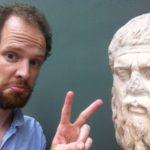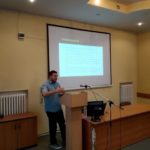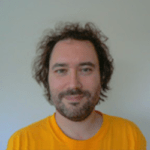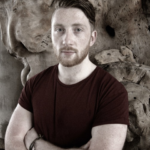The Armchair Philosophers are the wonderful people who answer your questions. Though diverse in many respects, they are united by their love for and postgraduate degrees in philosophy.
If you have a question for the Armchair Philosophers, don’t hesitate to get in touch. You can find us on X (formerly Twitter) @armchair_o or fill in this form.
If you like what we do, you can support us by buying us a coffee!
I received my PhD in philosophy in 2017; my dissertation was called “Plato's Bastard” (published as “Phenomenology as Platonism” [Phänomenologie als Platonismus]). My areas of interest are phenomenology, metaphysics and their overlap; but I dabble in whatever field I feel like – and with whoever's up for it. Philosophy to me means questioning our presuppositions, which fascinates me because it is something we can do whenever anyone says anything about anything and it never gets boring or old; it's also something that's painfully absent from public discourse, but easily learned. Enter: public philosophy!
I did a BA in Mathematics and Philosophy at Lancaster University, followed by an MPhil in Philosophy at the University of Warwick. I spent a lot of time studying Kant (his first Critique), the philosophy of mind, and the philosophy of language. My favourite philosophical idea is Quine's idea that the common-sense theory about physical objects and the gods of Homer are both just posits; the only difference is that the theory of physical objects turned out to be more efficient – that was the last idea to truly blow my mind.
I have been doing philosophy since 2012 and am currently working on my PhD at the University of Kent. I have a BA from Oklahoma Baptist University and an MA from the University of Florida. I am currently most interested in ethics-related issues of various kinds. My favorite works of philosophy, at present, are Aristotle's Nicomachean Ethics and, for very different reasons, David Enoch's Taking Morality Seriously.
I completed my MA and PhD at the Philosophy Department of Boğaziçi University. My main areas of research are history of philosophy, social and political philosophy, and moral philosophy. My dissertation was on Kant's account of conscience, so I had to work through most of Kant's texts. He is my favorite philosopher because he revolutionized the philosophical scene in Europe and still continues to be influential to this day. He was one of the first philosophers to work out a comprehensive system which integrates several areas of philosophy, and he has given me a remarkable sense of what philosophy can be.
I studied at the University of Lancaster (1999-2003) where I gained a BA Hons in Religious Studies & Philosophy, and a MA in Religious Studies. I gained my PhD in Religions & Theology at the University of Manchester (2004-2010) and the thesis was published by Gorgias Press as Antitheodicy, Atheodicy and Jewish Mysticism in Holocaust Theology (2012). I lectured for four years at the University of Manchester in the Department of Religions & Theology (2013-17) where I taught the History of Western Philosophy among other courses. I particularly revere the thought of Parmenides, Descartes, Spinoza, Kant, and Peter Kingsley.
I’ve taught university philosophy since 1998, including courses in history of philosophy, ethics, government and politics, religion, and multidisciplinary topics. My Ph.D. in philosophy is from the University of Essex. My academic research in social and political philosophy is on applying normative and applied ethical issues to increase understanding of social injustices and the responses to them. I explore how recognition theory and phenomenology can help us understand personhood, identity, injustice, social conflict, and social justice. Today, I teach part-time to devote more time to research and writing.
I did my BA in Philosophy & Creative Writing at London Metropolitan University, then completed MAs in Continental Philosophy at Warwick University and Social & Political Thought at Sussex University. I started (but didn’t complete) a DPhil at Sussex University, and have taught at Sussex, King’s College London and Birkbeck. I am particularly interested in political philosophy (both analytic and continental) and have studied modern philosophy (especially Descartes and Hume), Existentialism, Phenomenology, Critical Theory, and post-structuralist thought. I am most interested in the ancient Greek practice of parrhesia (the art of speaking frankly), as I think it is something we need very much right now.
I have a Masters degree in Philosophy from the University of South Carolina where I wrote a thesis on Immanuel Kant’s political philosophy under Konstantin Pollok. I am currently doing a PhD at the University of Groningen (the Netherlands) in the project “Universal Moral Laws” under Pauline Kleingeld. I am interested in Kant’s legal and political philosophy as well as contemporary jurisprudence and republicanism. Predictably, then, my favorite philosophical work is Kant’s Groundwork to the Metaphysics of Morals. This work contains, in my mind, some of most important ideas for the possibility of universal and objective moral laws.
I am a Lecturer in Liberal Arts & Politics Education at King’s College London. I completed my MPhil in Philosophy at the University of Warwick, and BA in PPE at Queen’s University Belfast. My PhD examined the relationship between contemporary capitalism and mental health. My key interests are in the politics and philosophy of time, political theory, philosophy of technology, the politics and philosophy of education, and experimental pedagogy. My favourite text is Deleuze’s Difference and Repetition. And my favourite quote, by Democritus: “This argument too shows that in reality we know nothing about anything, but each person’s opinion is something which flows in (epirusmiē).”
I did a BA in Philosophy and Literature at the University of Warwick, an MPhil in Philosophy at Warwick and am about to start a PhD in Philosophy at… Warwick. My primary research interests are the philosophy of cognitive science, philosophy of mind and the ontology of concepts (basically I want to know what concepts are). Immanuel Kant is the source of much inspiration for me. My views on cognition are overtly Kantian and I’m pretty sure he solved the whole idealism thing with transcendental idealism, the only sensible position one can take.









